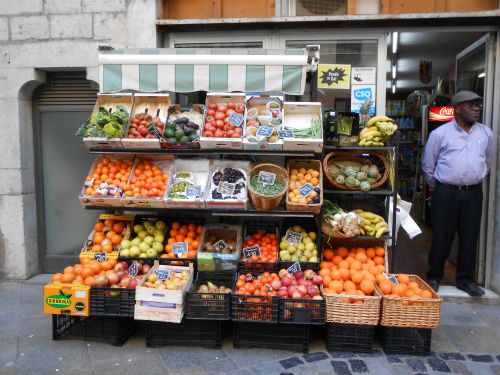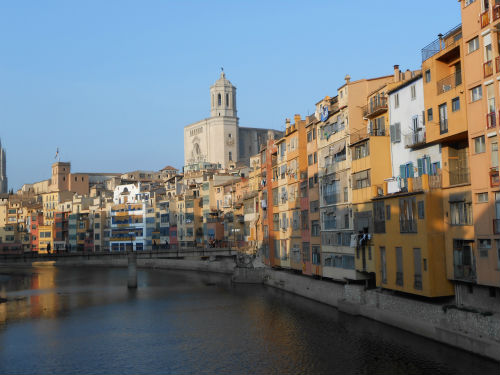Reflections of Public Health across the Globe
By Lori Jones
As a public health professional, I am always focused on
"seeing" public health in my surroundings. In March of 2015, I had the good fortune to travel across the globe to Spain,
specifically Madrid and Barcelona,
with a side trip to Girona. While the
purpose of my trip was not public health-related, true to form, I made some
observations regarding how public health appears different from our own country. Since April 6th marks the
beginning of National Public Health Week 2015, I thought this might be an ideal
time to share some of those observations.
Spain
was different from the United States
in many ways with regard to public health. I noted differences in how the country embraces sustainability. I also saw differences in their patterns of
diet and exercise, as well as the foods that were commonly available. The issue of smoking was seemingly
prioritized differently there. Finally, I
noticed a couple of things there that we might consider to be public health issues
here.
Spain
appears to be very involved in sustainability when it comes to energy use and
recycling. While there, I noticed high usage
of solar and wind energy within the country. Spain
does not have the natural gas and coal reserves that we have, so they are
forced to be more innovative to supply energy for their needs. The air quality in the cities appeared to be
better, due to these circumstances.
Public transportation is used extensively to get around in
the big cities. Despite the fact that
most automobiles were smaller than our typical vehicles, parking in the cities
appeared to be very limited. Public
transportation in the form of the metro and train systems allowed people access
to all areas of the bigger cities. We were
able to take the metro to visit many of the universities and attractions
located within the major cities, if they were not within walking distance of
our hotels. We took a train from Madrid
to Barcelona and again from Barcelona
to Girona. While the train seemed very
full of passengers, from my seat in the train I observed very little automobile
traffic on the highways we passed.
Recycling was commonplace in the places I visited. While the modern recycling bins often looked
out of place in their "old world" surroundings, their presence demonstrated a
huge commitment to "being green". It
likely cut down on the waste that would have ended up littering the streets
too.
As a dietitian, I definitely noticed food and exercise
patterns. I can confirm there is such a
thing as the Mediterranean diet. Fish
and seafood were a big part of the meals in Spain,
with many varieties of paella as the signature dish. Olives and olive oil were incorporated into many
meals; in fact, olive oil was consistently served with bread instead of butter. Lots of fruits and vegetables were available
across the country. Wine was available
at lunch and dinner. Croissants and
other pastries were very common as well .However, portion sizes were often smaller. When you are eating tasty,
high-quality foods, a smaller amount can satisfy. While fast food eateries were present as a
dining option, they certainly didn't dominate the landscape.

It was interesting comparing the snack foods we have here
versus there. For example, one of the
common snack foods here, a cheesy, orange puff, looked quite different over
there. The snack had a stronger cheese
smell and a much lighter color. This may
be due to the fact that some food additives that are allowed here are not
allowed in other countries like Spain. The product likely had a different
formulation altogether.
Eating patterns were different too. Breakfast seemed to be a smaller meal. Lunch was often a larger meal, usually served
a little later in the afternoon (around 2:00 p.m.)
than when Americans typically eat lunch. Dinner was usually served late in the evening, beginning around 8:00 p.m. While this eating pattern might seem disastrous to us, it works in Spain
because of the physical activity that people in Spain
get. They typically walk more than
Americans do and walk around in the city streets after dinner, rather than
curling up on a sofa. In fact, most of
the people I observed did not appear to have issues with being overweight or
obese.

Smoking was one area that Spain
could improve upon. Smoking appeared to
be very popular amongst people in Spain. It also seemed to be allowed or tolerated
more broadly than we see here. Open air
dining attracted more smokers as smoking was not permitted within many
restaurants. It was a little
disappointing to have so much unintended exposure to second-hand smoke.
While the cities I visited in Spain
were very beautiful and exhibited "old world charm," there were two issues that
marred that: graffiti and pet waste. Graffiti was everywhere in the cities I visited. When we see an area in the U.S.
that has a lot of graffiti, there are often safety concerns that come to
mind. However, I also came to learn that
graffiti in Spain
takes on a different meaning than it does in the United
States. Graffiti seemed more like art or political statements, rather than
markers of potentially unsafe areas. In
fact, some store owners actually commissioned the graffiti art for their
security gates to control what was placed there.
Pet waste was another big problem. Pet owners were allowed to walk their pets in
the city areas, but not required to clean up after them. Due to a lack of green space in many city
areas, this meant that you had to be very careful where you stepped when
walking on the sidewalk. As a pet owner
who is particular about cleaning up after my own dogs, I found this aspect very
unpleasant.

Overall, I enjoyed my time in Spain. Visiting Spain
provided me a wonderful opportunity to get a glimpse of what public health
looks like in another country. I hope
you have enjoyed a look at Spain
through my eyes. I think it would be
interesting to see what public health looks like in other countries from the
perspectives of others. I would love to
expand this article into a series to do just that. Have you traveled outside the United
States? Do you have some reflections to share about how public health is
envisioned and implemented in a different country? If so, please contact me at JonesL@stlouis-mo.gov. I would love to share your observations with
others and help them to "see" public health and its global impact.
Department of Health
City of St. Louis


